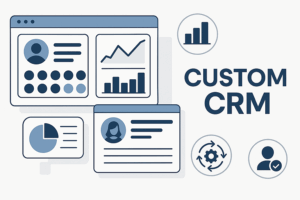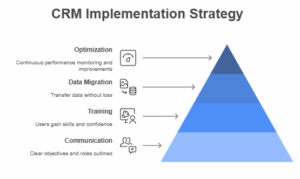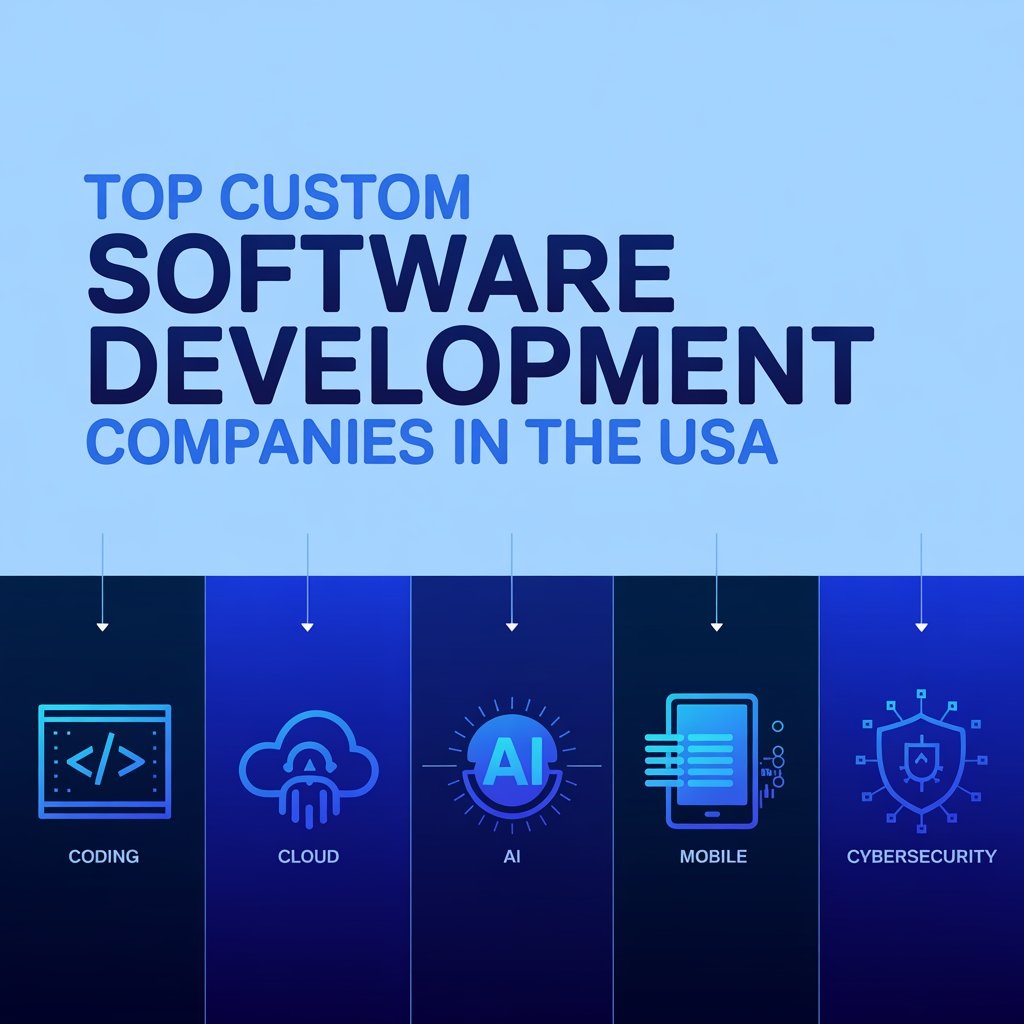A custom CRM system has evolved from a useful tool to a key factor in business growth in a digitally first world where tailored customer interactions are crucial. Businesses of all sizes are realising that generic CRM platforms frequently don’t provide the functionality, scalability, and flexibility required to support their distinct workflows and customer engagement strategies.
A CRM designed to meet your company’s needs gives you a competitive advantage. Unlike off-the-shelf alternatives, it adjusts to your processes rather than the other way around. A custom CRM solution guarantees that your teams have the resources they need to work more efficiently rather than more laboriously, whether you’re managing leads, cultivating client relationships, automating marketing, or examining sales pipelines.
This article examines the main arguments for why a custom CRM system is essential for sustained success, the advantages it offers companies and implementation considerations.
What Is a Custom CRM?

Let’s start with a brief explanation: What is a custom CRM? It is essentially a customer relationship management platform that has been created from the ground up or extensively customised to satisfy the unique business procedures, data structures, and goals of an organisation. A customisable CRM enables companies to create their logic, interface, integrations, and automation rules, in contrast to standard CRMs that adhere to strict templates.
Even though pre-made CRMs like Salesforce or HubSpot are plug-and-play, they frequently have extra features, unstated fees, and restrictions that impede growth, particularly for businesses with intricate or changing workflows. This is resolved by a custom CRM software solution, which provides accuracy and flexibility on all fronts.
Want to learn more about the pros and cons of custom vs. off-the-shelf? Read our guide: Custom Software Development vs. Off-the-Shelf Solutions
Why Businesses Are Turning to Custom CRM Solutions
Businesses require systems that empower their teams rather than limit them as competition rises. Many people are selecting custom CRM solutions over general-purpose platforms for the following reasons:
- They facilitate distinct workflows that are particular to sectors like B2B services, fintech, healthcare, and real estate.
- Native integration with internal software ecosystems or proprietary tools is a feature of custom CRMs.
- They guarantee full data ownership and improved adherence to laws such as GDPR.
- Based on team input, growth stages, or usage trends, businesses can scale functionality.
Higher ROI, improved user adoption, and increased operational efficiency are the results of these benefits.
Key Characteristics of Custom CRMs
Understanding the key characteristics and features that make up a successful implementation is crucial before making an investment in a custom CRM for your company. Long-term flexibility is ensured by a modular structure, which lets you add or remove features as your company grows. Your team will be able to use the system effectively and daily if it has an intuitive design.
Easy connections with tools such as marketing automation platforms, customer support software, analytics programs, and ERP systems are made possible by flexible integrations. Workflow automation frees up time for higher-value work by removing repetitive tasks like onboarding, billing, and follow-ups. You can maintain control and security by defining specific permissions for various departments or team members using role-based access.
Lastly, you can create dashboards and reports that represent your KPIs thanks to advanced analytics capabilities.
A small business CRM that can be tailored to your needs is just as valuable as one designed for large corporations.
Benefits of a Custom CRM System
Having a tool that aligns with your branding is just one benefit of utilizing a custom CRM system. It can change the way your company tracks sales opportunities, engages with customers, and makes strategic choices.
Here are some of the most impactful benefits:
Enhanced Customer Relationships
Businesses can gain a deeper understanding of customer behaviour by having complete control over the data model and interaction tracking. Stronger loyalty, increased satisfaction, and more individualised engagement result from this.
Increased Productivity and Collaboration
When the CRM accurately represents the tasks that teams are performing, they can work more productively. While shared data enhances departmental coordination, automation decreases manual labour.
Better Decision-Making
Decision-makers have a clear picture of marketing ROI, customer trends, and sales performance thanks to personalised dashboards and real-time analytics.
Cost Efficiency Over Time
Custom CRMs eliminate recurring license fees and scale to your needs and budget, even though initial development may be more expensive than purchasing a prebuilt solution.
Explore the CRM system developed by Litslink for tracking clients and brokers.
How to Build Your CRM System
The process can be divided into multiple steps if you’re wondering how to build your own CRM system:
1. Requirements Gathering
Define what your users need. Interview stakeholders, map out workflows, and identify pain points in your current system.
2. Feature Planning
Choose core features (lead management, email automation, reporting) and nice-to-have options (AI-based insights, mobile apps).
3. Design & Development
Work with a professional team to design a clean, intuitive interface and build it using scalable technologies.
4. Testing & Feedback Loops
Test with internal users, collect feedback, and iterate quickly.
5. Deployment & Support
To reduce disruption and give teams time to adjust, roll out the system in stages. Start with a core set of features, test them with a small user base, and then add more based on performance and feedback. To guarantee that every team member can use the system efficiently, conduct comprehensive onboarding sessions. You should also provide comprehensive documentation to facilitate continuous learning. Additionally, to maintain user engagement and keep the CRM in line with changing business needs, set up long-term support channels like a help desk, training refreshers, and system updates.
Custom Build CRM System Cost
The cost of a custom-built CRM system is one of the most frequently asked questions.
The answer depends on several variables:
- Scope of Features: More complex automations and analytics will cost more.
- Number of Users: Scaling for enterprise-level use increases infrastructure needs.
- Technology Stack: Choosing modern, scalable tools may require a higher initial investment, but it reduces future costs.
- Development Time: Faster timelines often require larger teams or more experienced developers.
A robust, enterprise-grade system can cost over $100,000, while a basic custom CRM may cost between $15,000 and $30,000. However, through increased productivity and client retention, many companies swiftly recover these expenses.
| CRM Type | Estimated Cost | Notes |
|---|---|---|
| Basic Custom CRM | $15,000 – $30,000 | Minimal features, small team, limited user capacity |
| Enterprise-grade CRM | $100,000+ | Advanced features, analytics, integrations, large user base, scalable infrastructure |
Custom CRM Implementation: What to Expect
Custom CRM implementation is a strategic endeavour that calls for cooperation from every department in your company, not just a technical one. Clear communication is the first step in a successful rollout, during which each department’s objectives, roles, and expectations are outlined. Effective onboarding and training guarantee that users have the skills and confidence necessary to operate the system effectively.
To transfer data from legacy systems into the new CRM without loss or inconsistency, data migration must be done carefully. After going live, continuous optimisation and monitoring are necessary to track performance, get user input, and make necessary feature improvements. By allowing teams to adapt gradually, a phased implementation strategy not only reduces disruption but also boosts adoption.

Customized CRM Solutions Across Industries
One of the greatest strengths of a customized CRM is that it’s applicable across every industry:
- Healthcare: Track patient journeys, automate follow-ups, and manage doctor schedules.
- Real Estate: Monitor property listings, manage client preferences, and send alerts.
- E-commerce: Automate customer segmentation, manage order history, and upsell based on behavior.
- Finance: Maintain contact records, integrate with accounting tools, and flag compliance risks.
- Education: Manage student communication, admissions pipeline, and feedback tracking.
Every business model gains from a custom CRM for business when it is in line with both long-term objectives and daily operations.
Maintenance and Support
A CRM is a long-term platform that grows with your company; it is not a one-time investment. For this reason, a solid maintenance plan should always accompany the implementation of a custom CRM. Providing ongoing support usually entails fixing technical problems with frequent updates and bug fixes, implementing new features in response to user input, installing required security patches to comply with regulations, and keeping an eye on system performance to guarantee peak performance. This ongoing care guarantees that the CRM will continue to be secure, efficient, and in line with your company’s objectives over time.
Need help managing the change? Read: How to Prepare Your Business for AI Adoption
Conclusion
Businesses require tools that enable them to provide faster, smarter, and more individualised experiences in a time when customer expectations are higher than ever. The intelligence, scalability, and flexibility required to forge deep connections, spur expansion, and maintain an advantage over rivals are all provided by a custom CRM system.
A custom CRM might be the wisest investment you make this year, regardless of whether you’re an established business seeking greater alignment or a startup seeking an advantage.
Fortunately, LITSLINK has a lot of experience developing custom software. We can also do that for you. Let’s get started—just get in touch with us!





